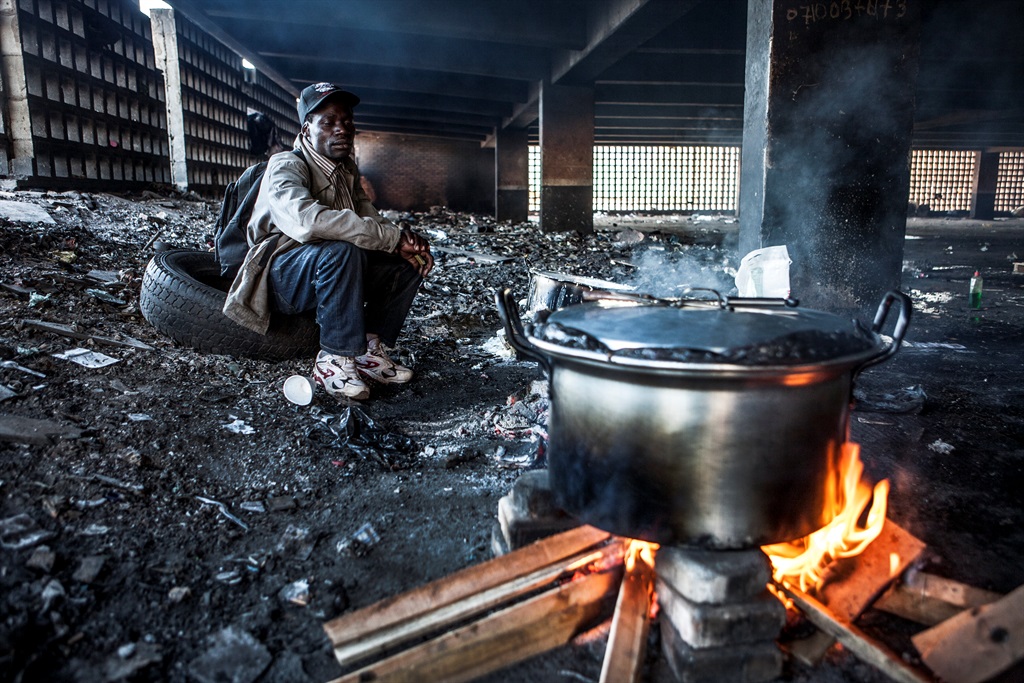
Park Station opens at 3am and as the clock edges forward past 2.59am a flood of humanity pushes through the station’s doors. Only some are heading for the first train out of Jozi – to jobs on the East Rand, in De Aar or further afield, or heading home to the hills of KwaZulu-Natal. The rest are simply coming in from the cold. They’re in search of a cup of tea, shelter from the wind. For the hungry the sellers are waiting. There are vendors selling magwinya (vetkoek) and bananas, single cigarettes and sweets – all neatly arranged on a makeshift box, a pick-up and carry box, an anywhere, anytime box. It’s a mobile shop that, at 10.30pm when the doors to the station close, can be packed up easily and carried away. You were never there, but you’ll be back in the morning.
Madoda made his way through these doors countless times. When he was particularly hungry and had money he bought a half brown loaf bunny chow and a pint of milk for R8. He got pap, skop (head of a cow, sheep or goat) and gravy on special days. It cost R20 but it kept him filled and satisfied for the rest of the day. And the next, if need be.
For Madoda, Park Station was home. It cost him R10 to keep his clothes in a locker and R10 to have a shower. The showers have in recent years been closed.
“Wash and go,” he calls it. “It’s essential if you don’t want anyone to know you live on the street. It’s a giveaway when you smell like a billygoat.”
Madoda has many lives. He is the chief executive of Nsizwana Media Group, and the director and owner of 90mins, a soccer website covering local and international football. For this, he is an accredited journalist and he attends press conferences and prematch sponsorship events. But he lives on the street. And it’s a secret he kept from his family and friends for many years.
Madoda remembers his first night on the street. He had been living in a flat in Jeppe.
“Me and six of my home boys from Empangeni and Emnambithi shared a one-room flat. We stayed there for seven months”’
He hadn’t had proper work for some time, but the boys in the flat supported him; they liked him. He had been an extra on Generations, playing the guy drinking at the bar. He also told them he was a writer, “a media guy”.
He’s a charming man and his home boys felt like they had a celebrity in their midst. Tami, who stayed in the flat, had a regular job as a cashier at Woolworths, so he bought food that was shared around.
It all happened one Friday in June.
“I remember that Friday. It was cold and wet,’ Madoda says. He had left the flat early in the morning for the Business Place, a government-subsidised help centre where he spent his day using the computers and hustling for work. After work Madoda headed home to Jeppe. He arrived to find everyone’s belongings on the street, and there were people everywhere, running and helping themselves to the spoils. The Red Ants had come early that morning and thrown everyone out. They locked the building and denied anyone access – his flat was padlocked shut. Madoda just stood and watched.
“I had a small camera I was sorry to lose. My only other belongings were clothes, and I didn’t want to scrabble through the pile to try see what was mine. My friends were nowhere to be seen.”
So he just walked away. With only the shirt on his back, he kept walking until he arrived at Park Station. Madoda had been there when he first arrived in Joburg eight years before. He remembered seeing people sleeping inside and he thought he would be safe for the night.
Tomorrow, he would figure out what to do. He found a place inside and sat on the floor. He was just nodding off when suddenly, at 10.30pm, the security guards started shouting and pushing people: “Out! Out!”
Madoda was scared. He didn’t want to go beyond the doors of the station, so he walked very slowly. But the security weren’t waiting. They kept pushing and shoving, and forced him out into the night. It was cold outside. He stood, confused and frightened.
A young woman greeted him.
“Hey, boetie,” she said, “come here.”
Madoda wasn’t sure why she was calling him. He feared she was luring him into a corner where armed men were waiting to rob him.
“I can see you’re new around here. Don’t go that way,” she said. “You’ll be robbed. The south side is where the tsotsis wait for everyone to leave. Come with me.”
Madoda followed her to the back of the station, where the kitchens were. Dozens of women in makeshift tents spent the night here, preparing food for the next day – food for travellers heading for the next train, or breakfast for the people who had spent the night on the street outside. Her name was Tafadzwa. Madoda took shelter under her little tent, with plastic sheeting over their heads to keep them dry. It rained that night, non-stop, in the middle of winter. Tafadzwa gave him a blanket for the cold.
“Try to sleep,” she said. But sleep didn’t come easily, so Madoda helped her cook. He prepared chicken and vegetables, cows’ heads and magwinya, finding warmth and comfort around her little gas cooker.
At 4.30am she gave him coffee and he headed into the station to find a toilet. He splashed cold water on his face and next thing a security officer grabbed him and tried to arrest him.
“You are not allowed to use the toilet basins to wash your face.”
Having drunk his morning coffee and washed, Madoda headed off to the Business Place. He did what he always did there. He used the computer, tried to update his website and hustled for work. He told no one about his night on the street. Everyone knew him. Actually, people thought he worked at the Business Place.
A while back someone had come to the centre to find out how to register a company. Madoda knew what to do and offered, for a small commission, to help him. Over time this little “work on the side” brought him a few hundred rand a month. So that first day passed and when nightfall came he said goodbye to everyone. It was no different. The usual cheery greetings of “see you tomorrow”, and Madoda left. No one knew he didn’t have anywhere to go.
Madoda headed back to Park Station, where he stayed until 10.30pm. When the doors closed he found Tafadzwa and again she shared her little tent with him, wrapping him in the warmth of her kindness. They cooked and talked.
Tafadzwa was 27 years old, from Zimbabwe. She cooked at the station every night so she could send money home to her children. She had a flat in Hillbrow that she shared with her sister.
Madoda stayed with Tafadzwa for two weeks. But he started to feel embarrassed. Ashamed.
“She was helping me and I could give her nothing in return,” Madoda says.
“It didn’t feel right. I should have been looking after her.”
One night he met a young man, Pelemba, at the station. They talked. Madoda liked him. He was from Mozambique, and when the doors closed, Pelemba said he would show Madoda where he slept.
“We walked a little way and then jumped over a small wall close to the station. Behind it was a school and we slept in the grounds there. Pelemba showed me how to live on the street, how to hide my belongings in the drain, and where to find cardboard to sleep on.”
Pelemba and Madoda were “street mates” for about three months until Pelemba’s wife took ill and he headed back to Mozambique. But Madoda had got used to their spot behind the wall, so he continued staying there, alone.
“I would go to sleep early, at 8pm – there was nothing else to do – and wake at 4.30am. Then I would head to the kitchens at Park Station, find Tafadzwa, buy coffee and magwinya, wash at Park Station and make my way to the Business Place in town.”
But one morning Madoda woke up to find that his wallet, with R300, and his cellphone, had been stolen. He no longer felt safe there. He needed to move. That evening after work he found himself wandering near Marshall Street where he met an old man who he calls Madala. Madala called out to him, “You seem like a nice guy, but you look lost.” Madoda told him that he needed a place to stay. Madala showed him where he placed his cardboard to sleep. Quiet and safe. There was a parking garage nearby and a security officer who watched the area all night. There were even security cameras. He found a drain nearby to store his blanket.
Madala had worked on the mines and been retrenched. He had no pension. He made a little bit of money fixing tiles near Ellis Park.
His family was in Mthatha, but he didn’t want to go there because he liked to drink and they would take his money from him. Madoda never asked anyone for help.
“Because I never want to rely on someone and then find myself kicked out,” he says.
“Never. Never that again.”
That hurt goes way back, to when he was a little boy running away at night to sleep in the ploughed mealie fields, finding protection from his grandmother’s stick, and comfort and solace in the dark outside.
That hurt has been repeated too many times – when his mother left him with his grandmother who beat him incessantly; when his friend and former business partner stole the money and left him to pick up the pieces; when his aunt in Joburg promised to look after him but kicked him out.
There were the endless promised jobs that never happened; the bills he couldn’t pay; the insecure flats and broken beds and borrowed floors that he slept on. And finally, the Red Ants, who came and took the little he had and threw him onto the street.
This story appears in Vaya: Untold Stories of Johannesburg – The people and stories that inspired the award-winning film. R300, Bookstorm. Available in all good bookshops and online as an ebook.




 Publications
Publications
 Partners
Partners








